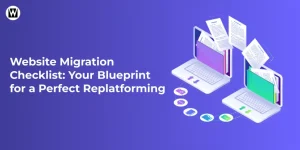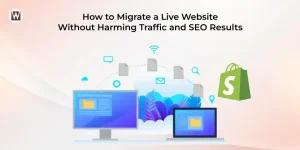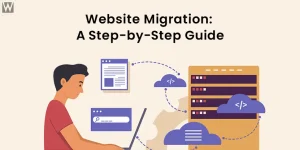When to Migrate Your Website: 15 Signs You Can’t Ignore
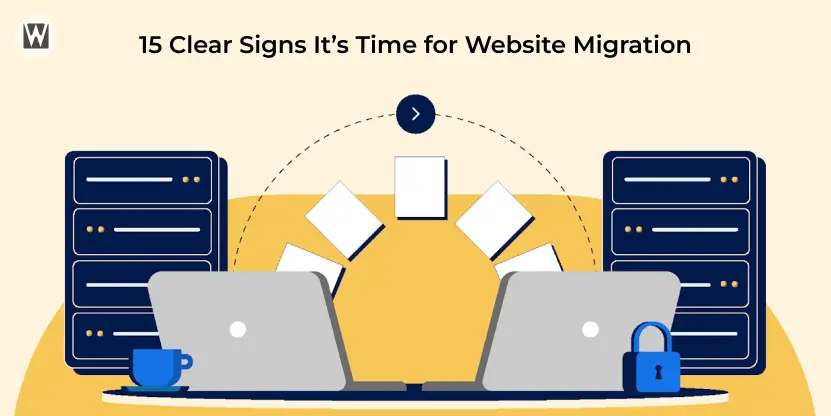
The popular saying we use in our daily lives is “change is constant,” which also applies to websites and online presence. Due to the evolving technological advancements and ever-changing preferences of customers, businesses have to keep up with the times.
The shape of the virtual environment evolves fast; new technologies, applications, and trends quickly fade away. What worked yesterday may no longer work today.
Research reveals that 38% of users will not spend time on a site with poor content or layout, and 40 % of shoppers will leave a website if it takes more than 3 seconds.
If your website cannot adapt to such changes, you will likely lose a lot of traffic and potential customers. Your website must evolve to stay relevant to your audience’s needs and behaviors.
In this blog, we will explain 15 important signals that indicate whether it is time to migrate your website. Whether you opt for a custom web design, modify or enhance the structure and interface of your site, or translate it to fit the mobile style, migration is the surefire way to get things done.
When Should You Consider Website Migration?
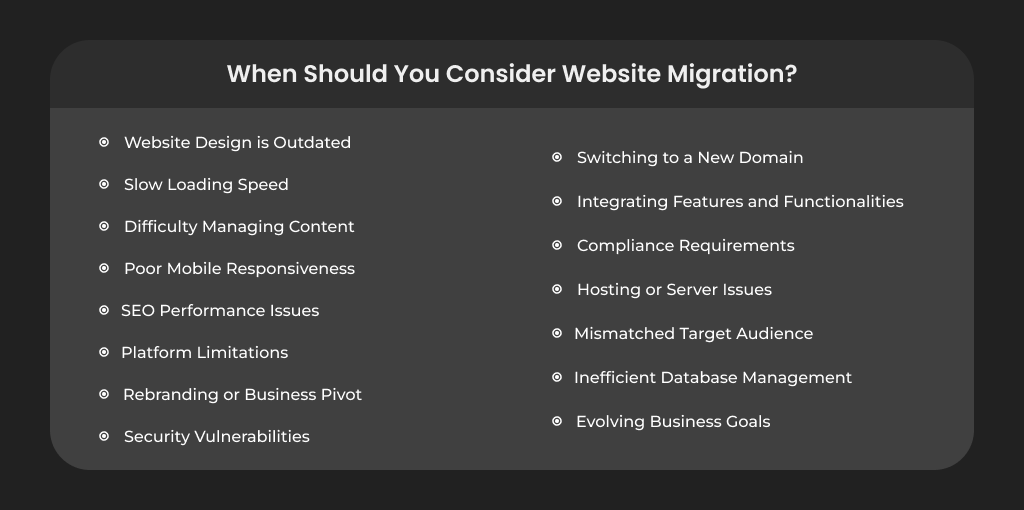
Website migration is not always easy; it is a process that needs to be thought over and implemented by professionals. However, signs indicate that migration is not only required but is also long overdue.
If you’re wondering about the exact steps to take, refer to our website migration checklist for a comprehensive overview.
Now, it is high time to discuss some of the main scenarios when website owners decide to migrate their websites.
Website Design is Outdated
This is so much so that an old website design can chase away visitors faster than you imagine. A user demands a current and sleek look in a modern society characterized by high-tech solutions. If your website has a dull look or needs to be appropriately designed according to the current market trends and practices, it may lead to people not trusting you.
For instance, it is possible to design a website that is not friendly to mobile devices or needs interactive content, so one might lag behind competitors who offer better user experiences. Website optimization should always be a priority; if your current design isn’t cutting it, migration might be the best option.
Slow Loading Speed
Every website must be optimized and load fast because speed impacts SEO factors. Facts reveal that 53% of mobile users will leave a site if it takes more than three seconds to load.
The website speed improvement through migration can have a drastic positive impact on performance and usagers. Moving to a better hosting plan or your site to a new web server cuts down on the amount of time it takes for your pages to load, increasing user satisfaction.
Difficulty Managing Content
Some issues that make migration necessary include difficulty managing content on your website or often needing help with complicated backend systems. Architectures back most older websites developed during the late 90s and early 2000s without inherently user-friendly CMS.
Migrating to a more intuitive platform allows you to scale and customize your website without requiring technical expertise. This makes adding blog posts, updating product listings, and managing multimedia content easier.
Poor Mobile Responsiveness
Mobile traffic currently stands at over 54% of the total website traffic, which explains why poor mobile responsiveness is such a big problem. If you have a website that’s submenu does not work well on mobile devices, you are losing a large portion of your customers.
If the mobile version of the website is not fully responsive and adaptive to all the necessary sizes or if a page takes too much time to load, then the time has probably come to migrate the website to a more suitable platform. Migration is an opportunity to select platforms that focus on the first mobile version and have a responsive structure.
SEO Performance Issues
If your website’s SEO performance is not improving despite your efforts, it could be a sign to migrate. Issues like unorganized site layout, broken links, slow page speed, or poorly coded content can all contribute to a worse-off SEO position.
Such problems can be solved by migration to a new platform or structure, and your website, in terms of SEO, will get a new life. For example, migrating from an outdated CMS to a more SEO-friendly platform like WordPress or Shopify development can lead to better URL structure, easier content updates, and integrated SEO tools.
Platform Limitations
Once your business starts growing, you may notice that your current platform no longer supports you and doesn’t offer advanced features and functionality. Whether adding new products, experiencing a boost in traffic, or integrating new features, your current platform is not satisfying all these aspects.
If you are experiencing any of the above situations, migrating to a scalable platform would be a better decision. Modern platforms, such as WordPress, Shopify, Magento, etc, offer more customization options and foster growth. Moreover, it also allows you to add new features, third-party tools, and a pleasing customer experience.
Rebranding or Business Pivot
A rebranding or business pivot more often requires a complete makeover of your website. If your brand image has changed or you have shifted your business focus, your website also should reflect those changes. A migration enables you to redesign your website to align with your new brand image, promising consistency across the search engines.
For example, if you have moved from offering one product line to a full-fledged services, your website also should have necessary information regarding that. Migrating during a rebrand allows for a smooth transition, ensuring that your online image matches your business vision.
Security Vulnerabilities
Living in the connected era, we can’t ignore security. If your website is not secure or has obsolete security features, it puts your business and customers at risk. If your website is running on a traditional CMS or platform with vulnerabilities, migrating to a robust and secure platform is necessary.
Upgrading to a platform that offers better security features such as SSL certificates, regular security patches, and robust payment gateways can help secure your website from sudden threats and attacks.
Switching to a New Domain
If you are rebranding or expanding your business, you perhaps decide to move to a new domain. A website migration is essential when switching domains to ensure that all URLs are redirected and SEO rankings are maintained.
Proper domain migration also allows you to set up new email addresses, update business listings, and ensure your website’s SEO integrity remains intact. A smooth migration process ensures that your website continues to perform well, even after the change in domain.
Integrating Features and Functionalities
As your business expands, you may need to integrate new features and functionalities into your website, such as an online store or customer portals. However, the new feature may be available on something other than your platform. Types of website migration include migrating to a platform where you can integrate such features without hindrances.
For example, moving from a simple website builder to a full-fledged eCommerce platform like Shopify or WooCommerce would help include online stores and transactions.
Migrating to a platform supporting these features not only increases the features your website can offer but is also much more helpful for your users, resulting in wider engagement and sales.
Compliance Requirements
As privacy laws and regulations evolve, your website must comply with new standards. Whether it’s GDPR compliance in the European religion or CCPA in California, your website must have the necessary tools and policies to protect user data. If your current platform is not equipped to handle these compliance requirements, migrating to a more secure and compliant system is important.
Hosting or Server Issues
Frequent downtimes, slow server performance, and unreliable hosting create a poor user experience and drive visitors away. In case your hosting service fails to meet your performance needs, it is time to consider migration to another hosting solution. Migration will not only enhance your load times but may also provide you with uptime guarantees and security features.
Mismatched Target Audience
Your website should be approached as a tool to satisfy the target audience’s preferences and behaviour. Some may shift into new markets or target different demographics, which may cause your current website to be less effective. Opting for a website migration aligning with your new target audience allows you to optimize the user experience for the specific demographics.
Inefficient Database Management
If your site exports unusually slow data retrievals, database failures, or struggles to properly manage larger amounts of content, you may suspect you have a database management problem. Migrating to a better database management system may resolve performance and stability issues on equal terms.
Evolving Business Goals
As your business goals evolve, so too should your website. Migration gives you the chance to align your website with your business goals, ensuring it supports your growth. For example, if your business is shifting from a local service provider to an international one, migration can help you optimize your website to cater to a broader audience, integrate more modern features, and enhance overall functionality.
Well, the list doesn’t end here. However, the major signs above surely indicate that your website needs a migration. No doubt, the process may seem cumbersome, but when you collaborate with professional website migration experts, the process becomes much easier.
Get Top-Notch Website Migration Services With WebyKing
If you are experiencing any of the problems discussed above, it’s time to talk to someone who can help you with a website migration.
Here are three questions of particular importance that should guide you thoroughly:
- Is my website attractive, with a seamless user experience that creates my strong brand image and helps me stay afloat in the ongoing market standards?
- Is the site performing well across all browsers and devices?
- Is it bringing business results or not?
If you are still hesitant and clueless about what to do, reach out and connect with us. We would be glad to discuss your website migration goals and leave no stone untouched when it comes to adding value to your business.
Frequently Asked Questions
How do I know if my website needs to be migrated?
If your website is outdated, or facing performance issues, it is a sign you may need to migrate to a more optimized platform.
Will site migration affect my SEO ranking?
Properly done migration, with 301 redirects, and proper planning, it won’t hurt your SEO rankings at all; rather, it’s going to improve them.
How long does a website migration take?
The length of time depends on the size and complexity of your site, but usually, it can take from a few days to a few weeks.
Whether you’re upgrading technology, improving performance, or rebranding your business, this checklist ensures a smooth and successful migration every step of the way. Get Your Free Checklist Now!

Ravi Makhija, the visionary Founder and CEO of WebyKing, is a seasoned digital marketing strategist and web technology expert with over a decade of experience. Under his leadership, WebyKing has evolved into a premier full service web and marketing agency, delivering innovative solutions that drive online success. Ravi’s deep understanding of the digital landscape combined with his passion for cutting-edge technologies empowers him to consistently exceed client expectations and deliver results that matter.


